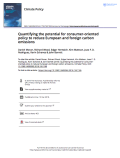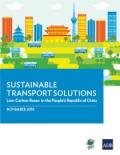
This study provides a clear picture of the state of G20 transport emissions, analyses already existing approaches for decarbonising the transport sector and stresses the urgency of putting ambitious climate action on the political agenda. It includes factsheets on each G20 member that shed light on the specific situation and challenges in each country, including existing goals and efforts. The report concludes by comparing stated ambition with implemented policies and actions while also considering required global reductions in the transport sector to keep the global temperature rise well below 2 degrees Celsius.

This report looks at a broad range of policies that could have potential direct and supply chain impacts on the level of greenhouse gas emissions produced at a national level.

This report provides investment potential estimates across six key sectors (waste, renewable energy, public transportation, water, electric vehicles, and green buildings). Sector-specific investment potentials are estimated at the global and regional levels. The report also addresses urban resilience, financing solutions, and includes six deep dives into specific cities – one from each region – representing various sizes and stages of development:

Low-carbon buses (LCBs), which include hybrid, plug-in hybrid, and different types of electric buses, have been promoted widely in cities in the People’s Republic of China (PRC). This report summarizes the experience of 16 cities in the PRC with an urban bus fleet of 70,000 units, and includes performance data on around 20,000 LCBs, of which nearly 10,000 are pure electric vehicles. The objective of this report is to show real world performance data on LCBs in the PRC, their environmental and financial impact, as well as policies used to promote LCBs.
This policy brief, The Infrastructure And Climate Change Nexus: Integrated approaches as a catalyst for transformational change, explores interlinkages between climate change mitigation and adaptation, and diverse forms of infrastructure. Given that infrastructure in every sector has climate implications, the brief raises awareness about the need for an integrated approach to the planning and development of resilient, low-carbon infrastructure assets to achieve the targets enshrined in the Paris Agreement and to boost climate-smart growth.
